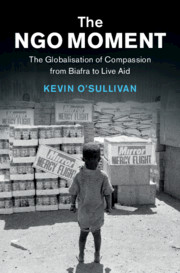Book contents
- The NGO Moment
- Human Rights in History
- The NGO Moment
- Copyright page
- Contents
- Acknowledgements
- Abbreviations
- Introduction
- Part I The Ends of Empire
- Part II An NGO Movement
- Part III Conduits of World Culture
- Part IV A People’s Compassion
- 7 The Turn to Human Rights
- 8 Populist Humanitarianism
- Conclusion
- Notes
- Bibliography
- Index
8 - Populist Humanitarianism
Ethiopia, 1984–1985
from Part IV - A People’s Compassion
Published online by Cambridge University Press: 01 October 2021
- The NGO Moment
- Human Rights in History
- The NGO Moment
- Copyright page
- Contents
- Acknowledgements
- Abbreviations
- Introduction
- Part I The Ends of Empire
- Part II An NGO Movement
- Part III Conduits of World Culture
- Part IV A People’s Compassion
- 7 The Turn to Human Rights
- 8 Populist Humanitarianism
- Conclusion
- Notes
- Bibliography
- Index
Summary
This chapter, on the rise of ‘populist humanitarianism’, describes the moment when the NGO sector’s appeal expanded irrevocably. The basic narrative will be familiar to many readers: the brutal famine, exaggerated by conflict, that ravaged the Horn of Africa in the mid-1980s; the vital role played by Western media outlets in driving the response; and the movement, led by celebrity humanitarians like Bob Geldof, that raised donations and popular engagement with the crisis to unprecedented levels. In many ways, that ‘movement’ ran counter to the principles on which the NGO sector had been constructed: it was anti-establishment, anti-bureaucratic, youth-focused and had a broad class base. Nonetheless, this chapter argues, it was the sector’s dexterity and its ability to mobilise its own bureaucracy to capture the rewards of the popular response, that was crucial in sealing its future success. By emphasising the twin calling cards of expertise and access to those in need in Ethiopia, the campaigns of the mid-1980s widened the support base for NGOs, reinforced their hierarchical, interventionist and depoliticising tendencies, and gave those organisations the resources that established them at the forefront of a new wave of popular engagement with the Third World.
- Type
- Chapter
- Information
- The NGO MomentThe Globalisation of Compassion from Biafra to Live Aid, pp. 156 - 174Publisher: Cambridge University PressPrint publication year: 2021
- 1
- Cited by



